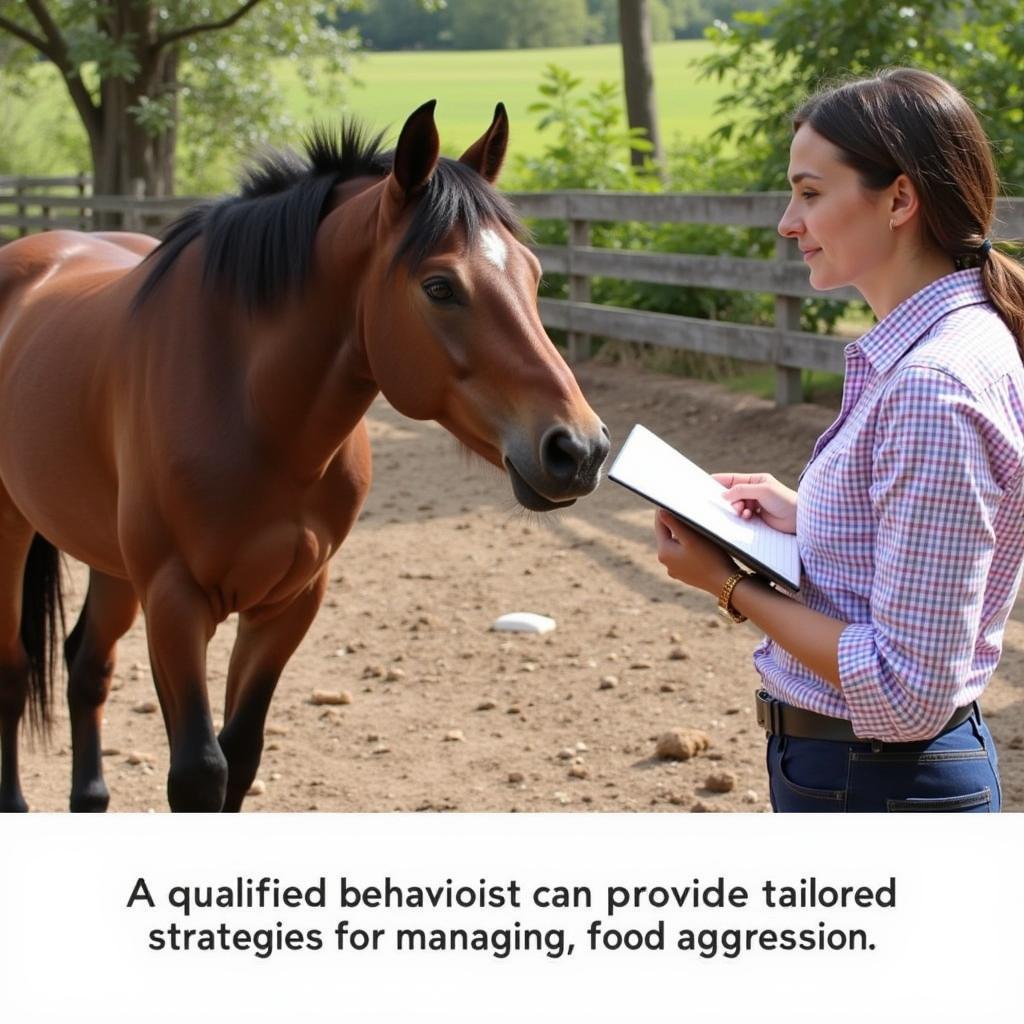Equine Food Aggression, a common behavioral issue in horses, can range from mild annoyance to dangerous displays of dominance. This article explores the causes, signs, and effective management strategies for dealing with food aggression in horses, ensuring both horse and handler safety.
What Triggers Equine Food Aggression?
Several factors contribute to food aggression in horses. Understanding these root causes is crucial for developing effective management techniques. Resource guarding, a natural instinct in many animals, including horses, is a primary driver. Horses may become aggressive if they perceive their food supply as limited or threatened.
- Past Experiences: Horses with a history of food scarcity or competition for resources are more likely to exhibit food aggression. A traumatic experience around feeding time can also contribute to this behavior.
- Social Dynamics: Herd dynamics play a significant role. A horse’s position within the herd hierarchy can influence their tendency to guard food. Dominant horses may exhibit aggression to assert their status.
- Learned Behavior: Inadvertently rewarding aggressive behavior, such as moving away when a horse pins its ears, can reinforce the unwanted behavior.
- Underlying Medical Conditions: In some cases, pain or discomfort during eating can lead to aggression. Dental issues, ulcers, or other medical problems may be contributing factors.
Recognizing the Signs of Equine Food Aggression
Identifying the subtle and overt signs of food aggression is essential for preventing dangerous situations. While some horses may exhibit clear aggression, others may display more subtle warnings.
- Pinning Ears: This is often the first sign of irritation or aggression.
- Baring Teeth: A clear threat display.
- Lunging or Snapping: An escalation of aggressive behavior.
- Kicking: A dangerous display of aggression that can cause serious injury.
- Tail Swishing: A sign of agitation, often accompanying other aggressive behaviors.
Managing Equine Food Aggression: Effective Strategies
Dealing with equine food aggression requires a multifaceted approach that prioritizes safety and addresses the underlying causes. Consistency and patience are key to success.
- Establish a Feeding Routine: Consistent feeding times and locations help reduce anxiety and competition.
- Separate Feeding Areas: Provide ample space between horses during feeding to minimize competition and resource guarding.
- Ensure Adequate Food Supply: Providing enough food for each horse can reduce the need to guard resources.
- Positive Reinforcement: Reward calm behavior during feeding time with gentle praise or a small treat.
- Desensitization Training: Gradually introduce the horse to being approached during feeding, rewarding calm responses. Start at a safe distance and slowly decrease the distance over time.
“Consistent training and positive reinforcement are crucial for managing food aggression,” says renowned equine behaviorist Dr. Emily Carter. “By addressing the underlying causes and rewarding desired behavior, we can help horses overcome this issue and develop a more positive association with feeding time.”
Addressing Underlying Issues
Sometimes, food aggression stems from underlying medical issues. Consulting with a veterinarian and an equine dentist is essential to rule out any physical causes. Addressing any underlying health problems can significantly improve a horse’s behavior.
When to Seek Professional Help
If a horse’s food aggression is severe or poses a safety risk, seeking professional help from a qualified equine behaviorist is crucial. They can assess the horse’s behavior, develop a tailored management plan, and provide guidance on safe handling techniques.
 Consulting an Equine Behaviorist
Consulting an Equine Behaviorist
Conclusion
Equine food aggression can be a challenging but manageable issue. By understanding its causes, recognizing the signs, and implementing appropriate management strategies, horse owners can create a safer and more positive feeding environment for both themselves and their horses. Remember, patience and consistency are key to achieving long-term success in addressing equine food aggression.
FAQs
- Can food aggression be completely cured? While complete eradication is not always guaranteed, consistent training and management can significantly reduce or eliminate aggressive behaviors.
- Is punishment effective in dealing with food aggression? Punishment is generally counterproductive and can escalate aggression. Positive reinforcement and desensitization are much more effective.
- How long does it take to see improvement? The timeline varies depending on the severity of the aggression and the horse’s individual temperament.
- Can all horses be trained to overcome food aggression? Most horses can be successfully managed with appropriate training and management techniques.
- What should I do if a horse becomes aggressive towards me during feeding? Back away slowly and calmly, avoid eye contact, and seek professional help if necessary.
For further assistance with equine food aggression or any other equine behavioral concerns, please contact us at Phone Number: 02437655121, Email: minacones@gmail.com Or visit our address: 3PGH+8R9, ĐT70A, thôn Trung, Bắc Từ Liêm, Hà Nội, Việt Nam. We have a 24/7 customer service team. Explore our other helpful resources and articles on equine health and behavior on our website.